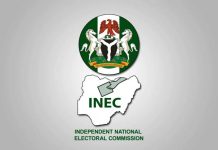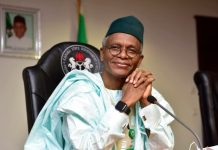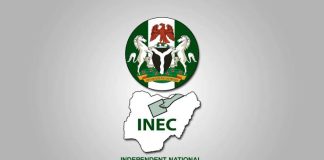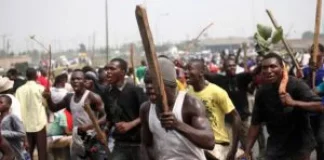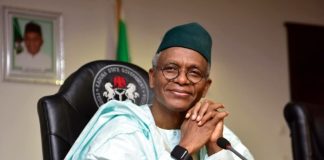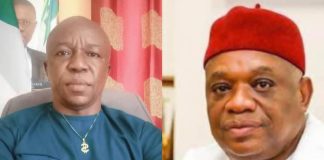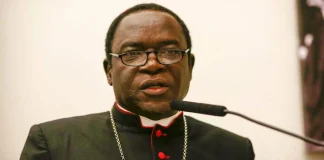🌿 Ruzu Non-Alcoholic Herbal Bitters
Ruzu Non-Alcoholic Herbal Bitters is a natural health supplement specially formulated to:
- ✅ Promote general wellness
- ✅ Detoxify the body
- ✅ Support the treatment of various ailments
Made from a powerful blend of 100% organic and medicinal herbs, Ruzu is completely alcohol-free, making it ideal for:
- 👪 All age groups
- 🌱 Health-conscious individuals
- 🌿 Anyone seeking non-alcoholic herbal remedies
Whether you're looking to boost your vitality, cleanse your system, or support healing the natural way, Ruzu Bitters offers a trusted herbal solution.
ALHAJI Bola Ahmed Tinubu, Nigeria’s president will be one year in office next week. But the carnage he has wreaked on Nigeria- individuals, families and institutions- could take more than one generation to fix, if it could be fixed at all. We can fix broken homes. We can restore businesses damaged by wrongful policy choices. We can fix government agencies made toxic by nepotistic appointments as has been the case from the regime of the former president, Maj.-Gen. Muhammadu Buhari, Nigeria’s affliction, to the extant Tinubu era. We can fix and/or restore anything and everything, but how do we restore to life citizens who were killed by the insensitivity of our rulers.
Many presidential candidates promised many and different things ahead of the 2023 election. Their promises then were immaterial, and they are still immaterial. Here, today, there will not be need to discuss what each candidate promised. The only promises that mattered now to Nigerians were those of Alhaji Tinubu who was declared the winner of the presidential election on March 1, 2023, by the ‘Independent’ National Electoral Commission [INEC]. However, we will quickly add that the promises of Tinubu, as important as they may seem, should only be rightly treated as vehicles designed to deliver to the citizens the prescriptions of aspects of the provisions in Chapter Two of the 1999 Constitution of Nigeria as amended. We will now proceed to highlight relevant provisos of the Constitution in the assessment of the performance of the Tinubu regime as it marks one year in office on May 29. To be charitable, one year of a four-year tenure or even eight years, as the case may be, is a short space of time to make a judgement call. The inimitable Matthew Hassan Kukah, Bishop of the Catholic Diocese of Sokoto, said as much recently. This tormentor of seemingly irredeemable succession of Nigeria’s wicked and no good rulers did not fail to warn Tinubu of the anger and hunger in the land and the potential cataclysmic effects of not recognizing and urgently addressing them.Kukah had said last week while on a visit to Tinubu that “Nigerians are in various levels of pain and they are pains that are unintended. But they are the results of certain policy decisions that hopefully, with time, can be AMENDED [emphasis mine] in order to serve the welfare of the people”. He added that he believed “that the essence of government is to guarantee the welfare and security of ordinary citizens. I believe that the times we are in now are very difficult times and nobody should be under any ILLUSION” [again my emphasis].Yes, l admit that one year may not be enough time to score the Tinubu regime or any administration anywhere for that matter. But this is Nigeria where anything goes including the case of a state governor who as part of his 100 days in office recently, listed attending a meeting of the Progressives Governors Forum, clearing some hectares of agricultural land, meeting with the national security adviser, among other inanities, as his achievements in office. Pray, do you want to wait for the full four-year tenure to raise the alarm that that governor is a disaster waiting to happen and a clear and present danger to the people of the state- Governor Musa Ododo and Kogi state in this absurd case. A state governor who listed activities as achievements has publicly declared his unpreparedness for the office and the inevitability of his failure. So why wait for four years?
In my Igbo nation we say that ‘ana esi na isi ahuru anu uto nsi’. l do not think this has English language equivalent. If it does l cannot readily remember it. Let me apologize to readers who may be extremely sensitive as l make attempt at transliteration. That Igbo saying means that you can guess the taste of a fecal discharge from the fart that precedes it. So the one year of the regime of Tinubu contains sufficient indicators of where the country is headed. Or where he is taking the country. And it does not look good. Indeed, it is frightening. The prognosis for the future of the country is dire. And foreboding. But before we go into the myopia of the Tinubu regime and it’s policy flip-flops in significant areas of governance, let us reference the minimum prescription of the 1999 Constitution as amended for the president and some other officers of the realm. Here, Chapter two, Fundamental Objectives and Directive Principles of State Policy, is key. Are we not agreed that the Constitution with its imperfections is the grundnorm of our laws and legal system. It does not matter now that the opening proclamation of the Constitution…’We the People’… was founded on profound fraud. We will overlook that. A section of Chapter Two provides that ‘the security and welfare of the people shall be the primary purpose of government’. How many of us- hailers and wailers alike- can say with conviction and in good conscience that Tinubu has sufficiently busied himself with providing ‘security and welfare’ to the people of Nigeria in the last twelve months? That this regime inherited a very challenging national security situation is not in doubt, but it is also not to be contested that it has made a bad security situation worse.
READ ALSO:OPINION: Waffling Ohanaeze and the Igbo aspiration
To illustrate, kidnapping for ransom under Buhari used to be on the highways and railways. But in this order, in addition to operating on highways and high seas, kidnappers routinely invade homes including residences in housing estates, to pluck their victims, march them deep into forests and then begin sometimes protracted negotiations for ransom. The kidnappers use GSM handsets, which SIMs are supposed to be registered in the names of individuals, to extract ransoms. They are never trailed. They are never traced. They are never caught. But innocent citizens routinely grapple with their telephone lines being blocked by the order of the government for alleged failure to link their telephone numbers with the their national identification numbers. The more we are recklessly subjected to the frequent abuse of biometric captures, the worse national security becomes. In the security sector which the Constitution made mandatory for any Nigerian leader, Tinubu thus far has failed.
On the welfare scale for the people as mandated for our rulers in Chapter Two of the Constitution, the unavoidable question to ask is whether your life is better today than it was on May 29, 2023? l wager that more than 99% of Nigerians will say a loud no. And Nigeria’s population is estimated to be about 220 million. The other day, one of those who belong to the one percent of privileged Nigerians, Alhaji Aliko Dangote, lamented that some of the economic policies of Tinubu were hurting individuals and businesses. For context, Dangote is Africa’s richest man by Forbes listing of the global wealthy people. In effect under this regime and their ill-digested policies, the ‘rich also cry’. If everybody is crying, the rich and the poor, then it is safe to assume that the policies of this administration are working only for those in the upper reaches of the government or indeed for foreigners including global capitalist institutions such as the World Bank and the International Monetary Fund [IMF]. The removal of the so-called petrol subsidy by this president on May 29, 2023, was the stupidest thing to do. The ripple effects of that dumb decision are still writ large on the country, and especially on the poor and vulnerable one year on. The Bretton Woods institutions sold a dummy to Tinubu that subsidy was evil and he fell for it. But we know that subsidy is embedded in the economic policies of the so-called arch-capitalist countries in Europe and North America.
These countries provide billions of dollars of subsidies to their people in addition to creating safety nets to keep the poor and vulnerable citizens quiet. Here, and in much of Africa and other developing world we do the opposite and expose our countries to instabilities and violent upheavals.
The regime may pretend not to know but the gravest problems afflicting the oil industry was, and still is, the industrial scale theft of Nigeria’s crude oil, the deliberate run down of the country’s refineries, the resort for many years to wholesale importation of petroleum products, the corruption of the elite embedded in the process, and of course, the cross border smuggling of the imported refined petroleum products in 33,000-litre-trucks to neighbouring countries. This administration was not on record to have done anything about these problems before it yanked off the so-called petrol subsidy. It took the line of the least resistance- declare war on the poor for they can do nothing. They can’t fight back.
The policy missteps and failings of the Tinubu regime in its first year in office are legion. You know them. I know them. We know them. So there’s no need itemizing them because we live with, and through, them daily. They are the reasons why in spite of ‘removing’ the so-called petrol subsidy, the government is still allegedly paying for petrol subsidy. It does not matter that there was no provision for petrol subsidy payment in the 2024 national budget. Where’s the regime getting the money for the payment of the alleged petrol subsidy. Could it be perpetrating illegality? Also the fumblings are the reasons why today petrol is scarce in many parts of the country. And expensive. At a time, a litre of petrol was selling for as much as N2000 at the pump head. These were some of the vices we were assured would vanish once they removed the phantom subsidy. Nigerians have forgotten about the many deadlines by this lying regime for the restart of production by the Port Harcourt, Nigerian state-owned, refinery. Even the privately-owned Dangote refinery in Lagos which was touted as the Hail Mary [no offence to Roman Catholics] project for petroleum products availability in the country and at fairly affordable prices has so far been of little or no effect. While it has not yet delivered on the Port Harcourt refinery, the administration has gone ahead to promise that the Kaduna refinery will restart operations in December 2024. The regime can behave as it pleased it because there are no consequences for it many lies and failures and bad behaviour. The regime will lie again on May 29.
It will claim what it has not delivered. It will make more promises of delivery. It will speak little to the delivery of earlier promises. It will ask us to be patient. But it will not give Nigerians the benchmarks and timelines for the delivery of its expected new promises. It has awarded N90 billion to subsidize pilgrimage to Mecca and Madina, and probably it will provide billions of Naira more to subsidize Christian pilgrims to Jerusalem. And then vote N1billion to build hostels in a dozen tertiary institutions. Subsidizing pilgrims is priority for Tinubu because it is the first salvo in the race for the 2027 elections. It speaks to the Muslim-Muslim presidential ticket and the made up vote bank of that segment of our population. The road to recovery is not in sight but we will deal with this in due season. The biggest achievement of Tinubu this past one year is taking Nigeria from the largest economy in Africa to number four, behind South Africa, Egypt and Algeria.
AUTHOR: UGO ONUOHA
Articles published in our Graffiti section are strictly the opinion of the writers and do not represent the views of Ripples Nigeria or its editorial stand.
If you like what we do, and are ready to uphold solutions journalism, kindly donate to the Ripples Nigeria cause.


